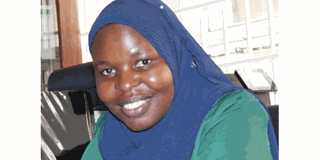Mak splits Journalism master’s programme

Dr Aisha Nakiwala, the head of the department of Journalism and Communication at Makerere University. PHOTO/FILE
What you need to know:
- The journalism and multimedia programme was conceived to ensure that graduate students develop journalistic skills in a multimedia context.
The Department of Journalism and Communication at Makerere University has phased out the Master’s in Journalism and Communication programme.
This is after the National Council of Higher Education (NCHE) gave the department a green light to split the course into two programmes; Master’s of Arts in Strategic and Corporate Communication and Master’s of Arts in Journalism and Multimedia.
In an interview with Monitor on Friday, the head of the department of Journalism and Communication, Dr Aisha Nakiwala, said students will now have to choose between journalism and communication.
“The media industry has been changing over the years and as a department, we had never reviewed this programme since its inception in 2004. This forced us to introduce what the market has demanded after making various consultations,” Dr Nakiwala said.
She added that with the advent of social media and new online tools, the university has to emphasize the current and changing trends in the online journalism and multimedia world to allow students to connect better with the ongoing and future demands in the industry.
“The journalism and multimedia programme was conceived to ensure that graduate students develop journalistic skills in a multimedia context. In so doing, the programme prepares students to respond to the new professional realities and to meet the expectations of the market,” Dr Nakiwala said.
Dr Willian Tayeebwa, the former head of the Department of Journalism and Communication, said the current review was completed and submitted to relevant offices for approval with the help of the Norwegian Programme for Capacity Development in Higher Education and Research for Development (NORHED).
The reviewed curriculum for both undergraduate and graduate levels was submitted before to the university senate and graduate school committees for final review and clearance to the NCHE.
However, the Senate did not approve the change in the undergraduate programme.
The approval of the master’s programme came after the university closed the application for slots for the next academic year. This means that all applicants have to change the course and choose between the two.
Old course units to be dropped
With the introduction of the new programmes, the department is slated to drop 80 percent of the old courses in the current programme.
“After consultations, we established that some of these course units are no longer relevant in the media industry. As a result, only a few core courses like research, media policy and theory will be maintained,” Dr Nakiwala said.
New course units such as Digital Journalism, Business and Financial Journalism, Social Media Management, Integrated Marketing and Communication, among others have since been introduced.
Ms Clare Muhindo, a student undertaking the old programme, said this has been long overdue.
“I think splitting the programme is a good idea. It is assumed that when you pursue a master’s degree, you gain specialised knowledge in a particular field. The original journalism and communication master’s programme on the other hand was a generalist. We learnt bits and pieces of each aspect of journalism and communication, which by the way is a very huge field,” Ms Muhindo said.
She added: “That meant that we didn’t go in depth. More attention was paid to the journalism field and only a little to the communication aspects. The only time one got to study/specialise in their field of interest was at the point of research. I believe splitting the programme will give prospective students a chance to specialise in their preferred fields of interest, thus making them more competitive in the job market.”
Fate of current students
The department has assured the students who are currently undertaking the Masters in Journalism and Communication that their certificates will still hold water.
“We shall not turn our back on those who qualify to complete the programme,’’ Nakiwala said.
She added: “When we offer the new programs doesn’t mean that those who offered the old program will not survive in the market. They were given relevant skills too.”
According to the university policy, when a new program is introduced, students in the system are given time to exit.




